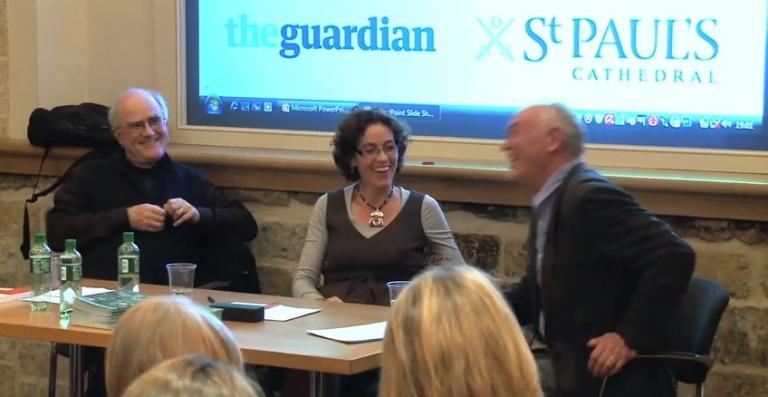
I thought about calling this post “Is Buddhist Fundamentalism like Christian Fundamentalism?” But after seeing that the bulk of the discussion was clearly on Buddhism, and in fact supporting a sort of “Buddhist Fundamentalism” I thought I’d change the title.
I have, on some occasions, been accused of being a “Buddhist Fundamentalist” over the past few years; usually for suggesting such things as the need to get back to the texts and exact meanings of key terms in order to understand the Buddha’s teaching in a certain place, or in suggesting that certain schools of Buddhism seem to depart radically from what the Buddha taught.
When I do either of these, I am implicitly assuming that “what the Buddha taught” is limited – the Buddha is/was not a divine being capable of giving teachings throughout history. He was a man who lived about 80 years and taught for 45 of those years.
I also assume that the best access to what he taught is in texts. I’m not naive in thinking that the texts ‘preserve’ anything like a perfect historical record, but it’s reasonable to believe that many of the historical events that happened in them actually happened. Much of this is corroborated by other texts and epigraphical evidence. There were kings such-and-such, and teachers such-and-such, and the historical Buddha – and they all did, to some extent, interact.
Buddhism, like Christianity, is amazingly diverse. It has 2400 years of history, has spanned the globe, and can be found in dozens of canonical languages, many of which are extinct today. Some suggest that due to this we should talk about Buddhisms (and, I would guess, Christianities). As a student of Buddhist philosophy, and perhaps more so as a lover of common sense, this strikes me as utterly ridiculous. All things are composed of diverse parts.
It is through language, conventional truth, that we create and use universal identifier such as ‘Buddhism’, ‘car’, and ‘computer’. If I talk about the history of the personal computer and you think I am speaking of the one sitting in front of you, and only that one, as if it represents perfectly every other PC in the world, you are, to be frank, an idiot. And in fact, you may be frustrated when I talk about things that don’t apply well to your PC, such as the development of the mouse (mine has a trackpad!). In fact a great lecture on the personal computer may not ever say anything about your particular computer.
This is often how Buddhists today react when they see/read something about “Buddhism” that doesn’t focus (enough) on their own form of Buddhism, or doesn’t self-qualify enough by saying “I’m covering certain generalities…” All too often, name-calling ensues.
But what is “Buddhist Fundamentalism?”
Buddhist fundamentalism, as discussed below (in the vide0) and often in cyberspace, is the privileging of ancient texts, almost always the Pali Canon, over everything since, including the beliefs and practices of contemporary Buddhists everywhere. It is, as Gregory Schopen recently described, “Bullshit to the 3rd power” (I’ll cover this in a separate post soon). “Bullshit to the 3rd power” is, more specifically according to Schopen, any discussion of “what the Buddha really meant.”
And this does seem to be the main concern of Buddhist Fundamentalists like Batchelor and Peacock.
The point that Peacock (one of my teachers during my MA days in Bristol) makes in responding to the question posed about being a Fundamentalist is excellent: that those who are concerned with understanding the early texts do so in conversation with tradition, not in isolation.The second part of his statement is a bit more controversial, that getting us back to the early texts gets us to a (mythical?) time before dogma.
This is however very different from the dogmatisms of other religions, namely Christianity and Islam, isn’t it? For Buddhism, at least according to Batchelor, Peacock (and myself to some degree), getting back to the ‘fundamentals’ means getting to a sort of pragmatic psychology which is meant to address universal human ethical concerns. For Christianity, there is usually the same ‘getting back to’ elements, but these are usually restricted to Jesus’s saying that “I am the truth, the way…. only though me….” and some of Paul’s writings and then an assortment of Old Testament ‘laws’ that support their own particular brand of restrictive morality.
Buddhist Fundamentalists (who might be one of those categories of people you can count on the fingers of one hand) aren’t people you should really worry about. They (we?) seem to believe that Buddhism’s most important thing is… the Buddha – and his teachings. And that the best way to them is the Pali Canon (though comparisons with existing Sanskrit/Chinese versions of the suttas are great). They acknowledge that the texts we have are ‘of a later date’ but also believe that oral preservation in India was as much a science as it was an art and thus trust that most of the teachings attributed to the historical Buddha did in fact come from a historical person: Bho (dear) Gotama, the wanderer, the Tathagata, the Buddha; and that we can use the differentiations in the many different versions to learn more both about the different historical circumstances of the different schools, and, perhaps even to discover mistakes in the texts that the tradition has taken to be most authentic.
Buddhist Fundamentalists are critical of the whole tradition, which includes the texts themselves, the early commentaries, and everything after – including contemporary Western Buddhists. And Fundamentalist Buddhists aren’t exclusively Western. I’ve met several Buddhists from Asia that share this ideal of getting back to the basics. In fact, many discussions of “Buddhist Modernism” in Asia or “Protestant Buddhism” discuss just this trend.
One of my own hobby-horses to note in all of this is the sense in which this is not all terribly new. Buddhists have been reinventing and defending and justifying themselves and appealing to the ‘original’, ‘early’, ‘true’, and/or ‘authentic’ teachings for about as long as Buddhism has been around. So while many Westerners are getting involved in this “return to the original” Buddhism thing, it is not because of Westerners that it exists. We can call it “Protestant” because it reminds us of Protestant Christians, and many will draw explicitly from the reasoning and strategies of Protestant theologians, but don’t make the mistake of thinking that all of this looking backward to find a truer present is caused by Protestant Christians or the Buddhist encounter with the West.
Getting back to Schopen, haven’t Buddhists, throughout history, always been concerned with – and happy to debate about – what the Buddha really meant?











